- Home
- Jhumpa Lahiri
The Lowland
The Lowland Read online
For Carin, who believed from the beginning,
and Alberto, who saw me to the end
lascia ch’io torni al mio paese sepolto nell’erba come in un mare caldo e pesante.
let me return to my home town entombed in grass as in a warm and high sea.
—GIORGIO BASSANI, “Saluto a Roma”
Contents
Part I
Chapter 1
Chapter 2
Chapter 3
Chapter 4
Chapter 5
Chapter 6
Part II
Chapter 1
Chapter 2
Chapter 3
Chapter 4
Part III
Chapter 1
Chapter 2
Chapter 3
Part IV
Chapter 1
Chapter 2
Chapter 3
Chapter 4
Chapter 5
Chapter 6
Chapter 7
Part V
Chapter 1
Chapter 2
Chapter 3
Chapter 4
Part VI
Chapter 1
Chapter 2
Chapter 3
Chapter 4
Part VII
Chapter 1
Chapter 2
Chapter 3
Chapter 4
Chapter 5
Chapter 6
Part VIII
Chapter 1
Chapter 2
Acknowledgments
A Note About the Author
Also by Jhumpa Lahiri
Part I
Chapter 1
East of the Tolly Club, after Deshapran Sashmal Road splits in two, there is a small mosque. A turn leads to a quiet enclave. A warren of narrow lanes and modest middle-class homes.
Once, within this enclave, there were two ponds, oblong, side by side. Behind them was a lowland spanning a few acres.
After the monsoon the ponds would rise so that the embankment built between them could not be seen. The lowland also filled with rain, three or four feet deep, the water remaining for a portion of the year.
The flooded plain was thick with water hyacinth. The floating weed grew aggressively. Its leaves caused the surface to appear solid. Green in contrast to the blue of the sky.
Simple huts stood here and there along the periphery. The poor waded in to forage for what was edible. In autumn egrets arrived, their white feathers darkened by the city’s soot, waiting motionless for their prey.
In the humid climate of Calcutta, evaporation was slow. But eventually the sun burned off most of the floodwater, exposing damp ground again.
So many times Subhash and Udayan had walked across the lowland. It was a shortcut to a field on the outskirts of the neighborhood, where they went to play football. Avoiding puddles, stepping over mats of hyacinth leaves that remained in place. Breathing the dank air.
Certain creatures laid eggs that were able to endure the dry season. Others survived by burying themselves in mud, simulating death, waiting for the return of rain.
Chapter 2
They’d never set foot in the Tolly Club. Like most people in the vicinity, they’d passed by its wooden gate, its brick walls, hundreds of times.
Until the mid-forties, from behind the wall, their father used to watch horses racing around the track. He’d watched from the street, standing among the bettors and other spectators unable to afford a ticket, or to enter the club’s grounds. But after the Second World War, around the time Subhash and Udayan were born, the height of the wall was raised, so that the public could no longer see in.
Bismillah, a neighbor, worked as a caddy at the club. He was a Muslim who had stayed on in Tollygunge after Partition. For a few paise he sold them golf balls that had been lost or abandoned on the course. Some were sliced like a gash in one’s skin, revealing a pink rubbery interior.
At first they hit the dimpled balls back and forth with sticks. Then Bismillah also sold them a putting iron with a shaft that was slightly bent. A frustrated player had damaged it, striking it against a tree.
Bismillah showed them how to lean forward, where to place their hands. Loosely determining the objective of the game, they dug holes in the dirt, and tried to coax the balls in. Though a different iron was needed to drive the ball greater distances, they used the putter anyway. But golf wasn’t like football or cricket. Not a sport the brothers could satisfactorily improvise.
In the dirt of the playing field, Bismillah scratched out a map of the Tolly Club. He told them that closer to the clubhouse there was a swimming pool, stables, a tennis court. Restaurants where tea was poured from silver pots, special rooms for billiards and bridge. Gramophones playing music. Bartenders in white coats who prepared drinks called pink lady and gin fizz.
The club’s management had recently put up more boundary walls, to keep intruders away. But Bismillah said that there were still sections of wire fencing where one might enter, along the western edge.
They waited until close to dusk, when the golfers headed off the course to avoid the mosquitoes, and retreated to the clubhouse to drink their cocktails. They kept the plan to themselves, not mentioning it to other boys in the neighborhood. They walked to the mosque at their corner, its red-and-white minarets distinct from the surrounding buildings. They turned onto the main road carrying the putting iron, and two empty kerosene tins.
They crossed to the other side of Technicians’ Studio. They headed toward the paddy fields where the Adi Ganga once flowed, where the British had once sailed boats to the delta.
These days it was stagnant, lined with the settlements of Hindus who’d fled from Dhaka, from Rajshahi, from Chittagong. A displaced population that Calcutta accommodated but ignored. Since Partition, a decade ago, they had overwhelmed parts of Tollygunge, the way monsoon rain obscured the lowland.
Some of the government workers had received homes in the exchange program. But most were refugees, arriving in waves, stripped of their ancestral land. A rapid trickle, then a flood. Subhash and Udayan remembered them. A grim procession, a human herd. A few bundles on their heads, infants strapped to parents’ chests.
They made shelters of canvas or thatch, walls of woven bamboo. They lived without sanitation, without electricity. In shanties next to garbage heaps, in any available space.
They were the reason the Adi Ganga, on the banks of which the Tolly Club stood, was now a sewer canal for Southwest Calcutta. They were the reason for the club’s additional walls.
Subhash and Udayan found no wire fencing. They stopped at a spot where the wall was low enough to scale. They were wearing shorts. Their pockets were stuffed with golf balls. Bismillah said they would find plenty more inside the club, where the balls lay on the ground, alongside the pods that fell from tamarind trees.
Udayan flung the putting iron over the wall. Then one of the kerosene tins. Standing on the remaining tin would give Subhash enough leverage to make it over. But Udayan was a few inches shorter in those days.
Lace your fingers, Udayan said.
Subhash brought his hands together. He felt the weight of his brother’s foot, the worn sole of his sandal, then his whole body, bearing down for an instant. Quickly Udayan hoisted himself up. He straddled the wall.
Should I stand guard on this side while you explore? Subhash asked him.
What fun would that be?
What do you see?
Come see for yourself.
Subhash nudged the kerosene tin closer to the wall. He stepped onto it, feeling the hollow structure wobble beneath him.
Let’s go, Subhash.
Udayan readjusted himself, dropping down so that only his fingertips were visible. Then he released his hands and fell. Subhash could hear him breathin
g hard from the effort.
You’re all right?
Of course. Now you.
Subhash gripped the wall with his hands, hugging it to his chest, scraping his knees. As usual he was uncertain whether he was more frustrated by Udayan’s daring, or with himself for his lack of it. Subhash was thirteen, older by fifteen months. But he had no sense of himself without Udayan. From his earliest memories, at every point, his brother was there.
Suddenly they were no longer in Tollygunge. They could hear the traffic continuing down the street but could no longer see it. They were surrounded by massive cannonball trees and eucalyptus, bottle-brush and frangipani.
Subhash had never seen such grass, as uniform as a carpet, unfurled over sloping contours of earth. Undulating like dunes in a desert, or gentle dips and swells in a sea. It was shorn so finely on the putting green that it felt like moss when he pressed against it. The ground below was as smooth as a scalp, the grass appearing a shade lighter there.
He had not seen so many egrets in one place, flying off when he came too close. The trees threw afternoon shadows on the lawn. Their smooth limbs divided when he looked up at them, like the forbidden zones of a woman’s body.
They were both giddy from the thrill of trespassing, from the fear of being caught. But no guard on foot or horseback, no groundsman spotted them. No one came to chase them away.
They began to relax, discovering a series of flags planted along the course. The holes were like navels in the earth, fitted with cups, indicating where the golf balls were supposed to go. There were shallow pits of sand interspersed here and there. Puddles on the fairway, strangely shaped, like droplets viewed under a microscope.
They kept far from the main entrance, not venturing toward the clubhouse, where foreign couples walked arm in arm, or sat on cane chairs under the trees. From time to time, Bismillah had said, there was a birthday party for the child of a British family still living in India, with ice cream and pony rides, a cake in which candles burned. Though Nehru was Prime Minister, it was the new Queen of England, Elizabeth II, whose portrait presided in the main drawing room.
In their neglected corner, in the company of a water buffalo that had strayed in, Udayan swung forcefully. Raising his arms over his head, assuming poses, brandishing the putting iron like a sword. He broke apart the pristine turf, losing a few golf balls in one of the bodies of water. They searched for replacements in the rough.
Subhash was the lookout, listening for the approach of horses’ hooves on the broad red-dirt paths. He heard the taps of a woodpecker. The faint strikes of a sickle as a section of grass elsewhere in the club was trimmed by hand.
Groups of jackals sat erect in packs, their tawny hides mottled with gray. As the light dwindled a few began to search for food, their lean forms trotting in straight lines. Their distraught howling, echoing within the club, signaled that it was late, time for the brothers to go home.
They left the two kerosene tins, the one on the outside to mark the place. They made sure to hide the one inside the club behind some shrubbery.
On subsequent visits Subhash collected feathers and wild almonds. He saw vultures bathing in puddles, spreading their wings to dry.
Once he found an egg that had dropped, intact, from a warbler’s nest. Carefully he carried it home with him, placing it in a terra-cotta container from a sweet shop, covering it with twigs. Digging a hole for it in the garden behind their house, at the base of the mango tree, when the egg did not hatch.
Then one evening, throwing over the putting iron from inside the club, climbing back over the wall, they noticed that the kerosene tin on the other side was missing.
Someone took it, Udayan said. He started to search. The light was scant.
Is this what you boys are looking for?
It was a policeman, appearing from nowhere, patrolling the area around the club.
They could distinguish his height, his uniform. He was holding the tin.
He took a few steps toward them. Spotting the putting iron on the ground, he picked it up, inspecting it. He set down the tin and switched on a flashlight, focusing its beam on each of their faces, then down the length of their bodies.
Brothers?
Subhash nodded.
What’s in your pockets?
They removed the golf balls and surrendered them. They watched the policeman put them in his own pockets. He kept one out, tossing it into the air and catching it in his hand.
How did you come to acquire these?
They were silent.
Someone invited you today, to play golf at the club?
They shook their heads.
You don’t need me to tell you that these grounds are restricted, the policeman said. He rested the shaft of the putting iron lightly against Subhash’s arm.
Was today your first visit?
No.
Was this your idea? Aren’t you old enough to know better?
It was my idea, Udayan said.
You have a loyal brother, the policeman said to Subhash. Wanting to protect you. Willing to take the blame.
I’ll do you a favor this time, he continued. I won’t mention it to the Club. As long as you don’t intend to try it again.
We won’t return, Subhash said.
Very well. Shall I escort you home to your parents, or should we conclude our conversation here?
Here.
Turn around, then. Only you.
Subhash faced the wall.
Take another step.
He felt the steel shaft striking his haunches, then the backs of his legs. The force of the second blow, only an instant of contact, brought him to his hands and knees. It would take some days for the welts to go down.
Their parents had never beaten them. He felt nothing at first, only numbness. Then a sensation that was like boiling water tossed from a pan against his skin.
Stop it, Udayan shouted to the policeman. He crouched next to Subhash, throwing an arm across his shoulders, attempting to shield him.
Together, pressed against one another, they braced themselves. Their heads were lowered, their eyes closed, Subhash still reeling from pain. But nothing more happened. They heard the sound of the putting iron being tossed over the wall, landing a final time inside the club. Then the policeman, who wanted nothing more to do with them, retreating.
Chapter 3
Since childhood Subhash had been cautious. His mother never had to run after him. He kept her company, watching as she cooked at the coal stove, or embroidered saris and blouse pieces commissioned by a ladies’ tailor in the neighborhood. He helped his father plant the dahlias that he grew in pots in the courtyard. The blooming orbs, violet and orange and pink, were sometimes tipped with white. Their vibrancy was shocking against the drab courtyard walls.
He waited for chaotic games to end, for shouts to subside. His favorite moments were when he was alone, or felt alone. Lying in bed in the morning, watching sunlight flickering like a restless bird on the wall.
He put insects under a domed screen to observe them. At the edges of the ponds in the neighborhood, where his mother sometimes washed dishes if the maid happened not to come, he cupped his hands in turbid water, searching for frogs. He lives in his own world, relatives at large gatherings, unable to solicit a reaction from him, sometimes said.
While Subhash stayed in clear view, Udayan was disappearing: even in their two-room house, when he was a boy, he hid compulsively, under the bed, behind the doors, in the crate where winter quilts were stored.
He played this game without announcing it, spontaneously vanishing, sneaking into the back garden, climbing into a tree, forcing their mother, when she called and he did not answer, to stop what she was doing. As she looked for him, as she humored him and called his name, Subhash saw the momentary panic in her face, that perhaps she would not find him.
When they were old enough, when they were permitted to leave the house, they were told not to lose sight of one another. Together they wandered down
the winding lanes of the enclave, behind the ponds and across the lowland, to the playing field where they sometimes met up with other boys. They went to the mosque at the corner, to sit on the cool of its marble steps, sometimes listening to a football game on someone’s radio, the guardian of the mosque never minding.
Eventually they were allowed to leave the enclave, and to enter the greater city. To walk as far as their legs would carry them, to board trams and busses by themselves. Still the mosque on the corner, a place of worship for those of a separate faith, oriented their daily comings and goings.
At one point, because Udayan suggested it, they began to linger outside Technicians’ Studio, where Satyajit Ray had shot Pather Panchali, where Bengali cinema stars spent their days. Now and then, because someone who knew them was employed on the shoot, they were ushered in amid the tangle of cables and wires, the glaring lights. After the call for silence, after the board was clapped, they watched the director and his crew taking and retaking a single scene, perfecting a handful of lines. A day’s work, devoted to a moment’s entertainment.
They caught sight of beautiful actresses as they emerged from their dressing rooms, shielded by sunglasses, stepping into waiting cars. Udayan was the one brave enough to ask them for autographs. He was blind to self-constraints, like an animal incapable of perceiving certain colors. But Subhash strove to minimize his existence, as other animals merged with bark or blades of grass.
In spite of their differences one was perpetually confused with the other, so that when either name was called both were conditioned to answer. And sometimes it was difficult to know who had answered, given that their voices were nearly indistinguishable. Sitting over the chessboard they were mirror images: one leg bent, the other splayed out, chins propped on their knees.
They were similar enough in build to draw from a single pile of clothes. Their complexions, a light coppery compound derived from their parents, were identical. Their double-jointed fingers, the sharp cut of their features, the wavy texture of their hair.
Subhash wondered if his placid nature was regarded as a lack of inventiveness, perhaps even a failing, in his parents’ eyes. His parents did not have to worry about him and yet they did not favor him. It became his mission to obey them, given that it wasn’t possible to surprise or impress them. That was what Udayan did.

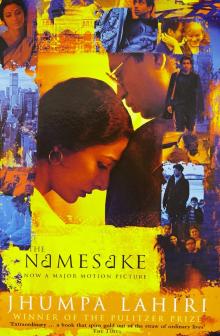 The Namesake
The Namesake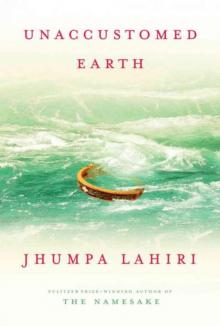 Nobody's Business
Nobody's Business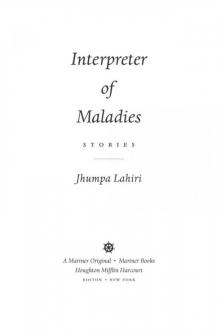 Interpreter of Maladies
Interpreter of Maladies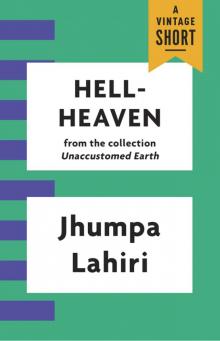 Hell-Heaven
Hell-Heaven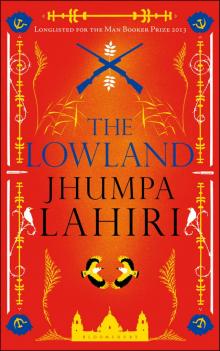 The Lowland
The Lowland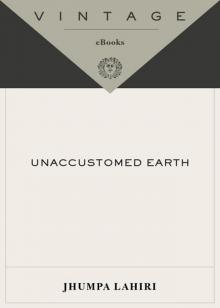 Unaccustomed Earth
Unaccustomed Earth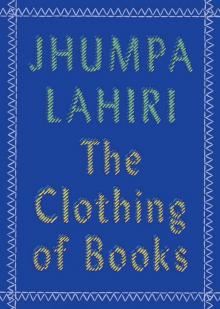 The Clothing of Books
The Clothing of Books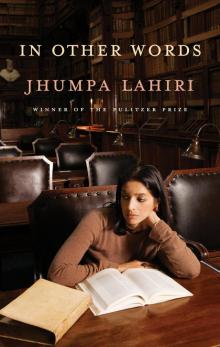 In Other Words
In Other Words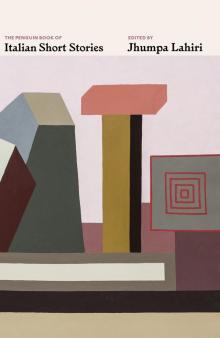 The Penguin Book of Italian Short Stories
The Penguin Book of Italian Short Stories